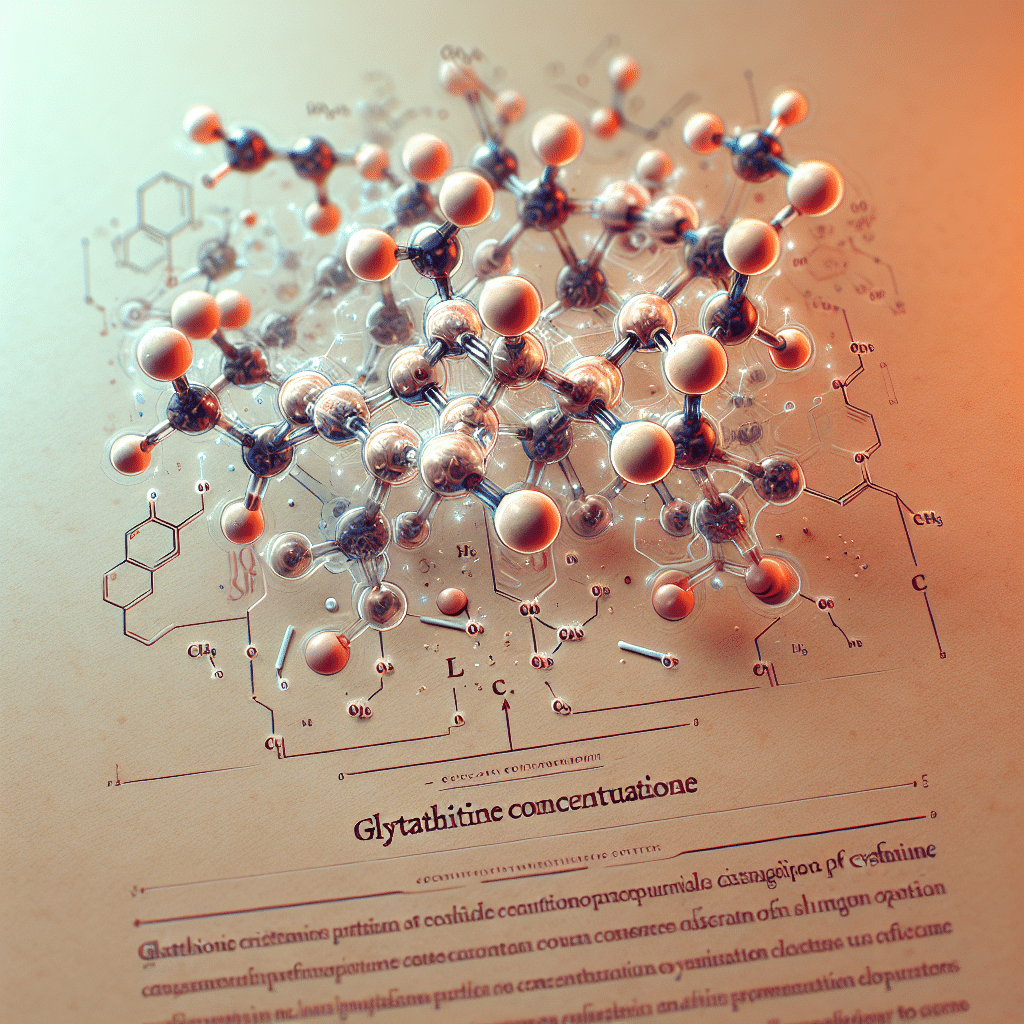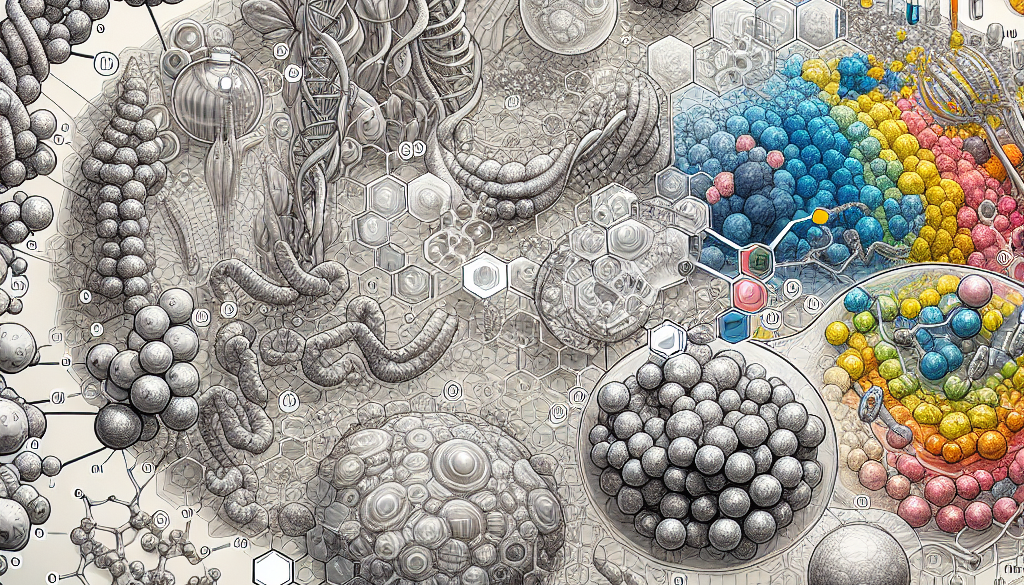Glutathione Cysteine Concentration: Importance
-
Table of Contents
- Glutathione Cysteine Concentration: Key to Antioxidant Defense
- Understanding Glutathione and Its Functions
- The Importance of Cysteine in Glutathione Synthesis
- Factors Affecting Glutathione Cysteine Concentration
- Health Benefits of Adequate Glutathione Cysteine Concentration
- Glutathione Deficiency and Related Health Issues
- Strategies to Boost Glutathione Levels
- Conclusion: The Critical Role of Glutathione Cysteine Concentration
- Enhance Your Health with ETprotein’s Protein Products
Glutathione Cysteine Concentration: Key to Antioxidant Defense

Glutathione, often referred to as the “master antioxidant,” is a tripeptide composed of three amino acids: glutamine, cysteine, and glycine. It plays a crucial role in protecting cells from oxidative stress and maintaining overall health. The concentration of cysteine in glutathione is particularly important, as it is the limiting precursor for glutathione synthesis. This article delves into the significance of glutathione cysteine concentration and its impact on human health.
Understanding Glutathione and Its Functions
Glutathione is a small molecule found in almost every cell of the body. It is involved in several vital processes, including:
- Neutralizing free radicals and reactive oxygen species (ROS)
- Regenerating vitamins C and E
- Transporting mercury out of cells and the brain
- Supporting the immune system
- Assisting in the metabolic and biochemical reactions, such as DNA synthesis and repair
- Activating enzymes
The cysteine residue in glutathione is critical because it contains a thiol (sulfhydryl) group, which is responsible for the antioxidant activity of glutathione. The availability of cysteine is often the rate-limiting step in the synthesis of glutathione.
The Importance of Cysteine in Glutathione Synthesis
Cysteine is an amino acid that can be obtained from dietary sources or synthesized from methionine. However, the body’s ability to produce cysteine may not always meet its needs, especially under conditions of oxidative stress or illness. Therefore, maintaining adequate cysteine levels is essential for optimal glutathione production.
Factors Affecting Glutathione Cysteine Concentration
Several factors can influence the concentration of cysteine and, consequently, glutathione levels in the body:
- Diet: Consuming foods rich in cysteine, such as poultry, yogurt, egg yolks, red peppers, garlic, onions, broccoli, Brussels sprouts, oats, and wheat germ, can help maintain adequate levels.
- Age: Glutathione levels naturally decline with age, making older individuals more susceptible to oxidative stress.
- Health status: Chronic diseases, such as cancer, HIV/AIDS, and liver disease, can deplete glutathione levels.
- Lifestyle: Smoking, alcohol consumption, and exposure to environmental toxins can reduce glutathione levels.
- Medications: Certain medications can affect cysteine and glutathione metabolism.
Health Benefits of Adequate Glutathione Cysteine Concentration
Ensuring sufficient levels of cysteine for glutathione synthesis has numerous health benefits:
- Antioxidant Protection: Glutathione directly neutralizes free radicals, reducing oxidative stress and preventing cellular damage.
- Detoxification: Glutathione binds to toxins and facilitates their excretion from the body.
- Immune System Support: Glutathione enhances the function of immune cells, helping to fight off infections and diseases.
- Anti-Aging Effects: By reducing oxidative stress, glutathione can slow down the aging process and prevent age-related diseases.
- Improved Mental Health: Glutathione has been linked to improved cognitive function and a lower risk of neurodegenerative diseases.
Glutathione Deficiency and Related Health Issues
A deficiency in glutathione can lead to a range of health problems, including:
- Oxidative stress-related conditions, such as cardiovascular diseases and cancer
- Neurodegenerative diseases, like Alzheimer’s and Parkinson’s disease
- Chronic fatigue syndrome
- Autoimmune disorders
- Liver diseases
Therefore, maintaining adequate glutathione cysteine concentration is vital for preventing these health issues.
Strategies to Boost Glutathione Levels
There are several ways to enhance glutathione levels in the body:
- Dietary changes: Incorporating cysteine-rich foods and foods that contain precursors to glutathione synthesis
- Supplementation: N-acetylcysteine (NAC) and whey protein are commonly used supplements to boost cysteine and glutathione levels
- Lifestyle modifications: Reducing exposure to toxins, managing stress, and getting adequate sleep can help maintain glutathione levels
- Exercise: Regular physical activity has been shown to increase glutathione levels
Conclusion: The Critical Role of Glutathione Cysteine Concentration
In conclusion, glutathione cysteine concentration is a cornerstone of the body’s antioxidant defense system. Adequate levels are essential for preventing oxidative stress, supporting immune function, detoxifying harmful substances, and promoting overall health and longevity. By understanding the factors that affect glutathione levels and implementing strategies to maintain them, individuals can significantly contribute to their well-being and reduce the risk of various health conditions.
Enhance Your Health with ETprotein’s Protein Products
If you’re looking to support your glutathione levels through dietary supplementation, ETprotein offers a range of high-quality protein products that can help. Their selection includes organic rice protein, pea protein, and other plant-based proteins that are rich in cysteine and other amino acids necessary for glutathione synthesis. With non-GMO, allergen-free attributes, and high purity, ETprotein’s offerings cater to a diverse range of dietary needs and preferences.
About ETprotein:
ETprotein, a reputable protein and L-(+)-Ergothioneine (EGT) Chinese factory manufacturer and supplier, is renowned for producing, stocking, exporting, and delivering the highest quality organic bulk vegan proteins and L-(+)-Ergothioneine. They include Organic rice protein, clear rice protein, pea protein, clear pea protein, watermelon seed protein, pumpkin seed protein, sunflower seed protein, mung bean protein, peanut protein, and L-(+)-Ergothioneine EGT Pharmaceutical grade, L-(+)-Ergothioneine EGT food grade, L-(+)-Ergothioneine EGT cosmetic grade, L-(+)-Ergothioneine EGT reference grade and L-(+)-Ergothioneine EGT standard. Their offerings, characterized by a neutral taste, non-GMO, allergen-free attributes, with L-(+)-Ergothioneine purity over 98%, 99%, cater to a diverse range of industries. They serve nutraceutical, pharmaceutical, cosmeceutical, veterinary, as well as food and beverage finished product distributors, traders, and manufacturers across Europe, USA, Canada, Australia, Thailand, Japan, Korea, Brazil, and Chile, among others.
ETprotein specialization includes exporting and delivering tailor-made protein powder and finished nutritional supplements. Their extensive product range covers sectors like Food and Beverage, Sports Nutrition, Weight Management, Dietary Supplements, Health and Wellness Products, and Infant Formula, ensuring comprehensive solutions to meet all your protein needs.
As a trusted company by leading global food and beverage brands and Fortune 500 companies, ETprotein reinforces China’s reputation in the global arena. For more information or to sample their products, please contact them and email sales(at)ETprotein.com today.














